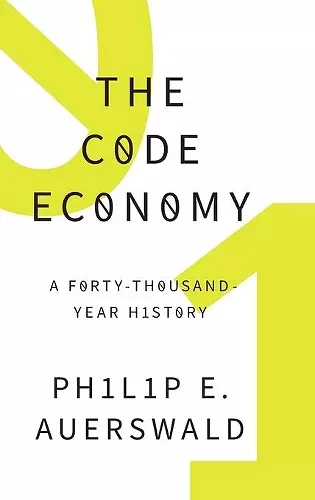The Code Economy
A Forty-Thousand Year History
Format:Hardback
Publisher:Oxford University Press Inc
Published:13th Apr '17
Currently unavailable, and unfortunately no date known when it will be back

The "code economy " refers to the evolving technologically-driven environment we live in. In services or manufacturing, outputs emerge more and more from coded computerized systems and less as assembled mechanical devices and procedures. Industries seek algorithms to make software not only more pliable for firms' development of products and services, but also to market them and ease their purchase and use by consumers. This process automates jobs. It gives increasing economic advantage to entrepreneurs who can harness "code " to serve on the large scale the growing niches into which consumers are organized. Yet, mastering the "code " also gives individuals and informal social networks the resources to bundle products and services and put them up for sale and convenient use at more local levels. The economics of the rest of the 21st century will see the movement away from traditional firms and more toward people's relying on themselves as the sources of their livelihoods. The code economy has clearly not developed in a vacuum. Invention, innovation, and the pursuit of happiness have characterized human activities for centuries. What is changing is how societies and individuals radically value endeavors in life differently from even a decade ago, most notably away from industries organized as "command and control " systems. In The Code Economy, Philip Auerswald investigates how economists themselves have been hard pressed to gauge new economic indices of satisfaction that go beyond traditional measures. He explores how the code or "shared " economy reaches into domains such as health, where greater longevity, the popularization of medical knowledge, and the emphases on preventive care and wellness will complement the delivery of medical services. Further, living in the code economy will prompt people to orient their children's futures to more self-reliant pursuits and seek investments that truly serve them and not the institutions that have traditionally dominated the financial and economic worlds.
"Code is modern alchemy -- transmuting thought into action, labor into capital. As computers saturate our world and code runs everywhere, this book offers a history of how we got here and a glimpse into our highly interesting future." - Marc Andreessen, cofounder Netscape and Andreessen Horowitz "By showing how human civilization has advanced over centuries through the creation and improvement of what we now call "code" Philip Auerswald recounts an amazing history that helps us understand how we will live and work in the future." - Walter Isaacson, author of Steve Jobs and The Innovators, president and CEO of the Aspen Institute "Philip Auerswald weaves a compelling metaphor for a socio-economic ecosystem whose "code" determines its behavior in sometimes subtle ways. These ideas help us make sense of long- and short-term phenomena that we encounter as we try to understand, and even to predict, some of the vicissitudes of our 21st Century lives." - Vint Cerf, Internet Pioneer "The Code Economy is a strikingly interesting and important book. Much of economic thought focuses on consumption. Auerswald focuses instead on the history of production, recounting the evolution of code as "recipes" from the origin of writing to the development of the Internet; from the culinary creations of Julia Child to the manufacture of airplanes. Read it." - Stuart Kauffman, author of At Home in the Universe and The Origins of Order "The genius of The Code Economy is putting innovation, automation, and artificial intelligence in historical context -- telling the story of technology from the dawn of humanity to present. It should be required reading for anyone in the tech industry." - Kristin Sharp, Executive Director of the Shift Commission on Work, Workers, and Technology, New America "Phil Auerswald looks at the economy as an ever-changing, ever-evolving set of arrangements, procedures and recipes - a "code economy." The result is a delightful account of how human activities have gathered power and complexity over centuries. Original, interesting, and thought-provoking." - W. Brian Arthur, author of Complexity and the Economy "The end of the industrial era also means the of "organization man"--the phenomenon of people shaping themselves into institutional puzzle pieces in order to earn a livelihood. Philip Auerswald understands this. With engaging story-telling combined with insightful analysis, Auerswald recounts the history of work over the span of centuries. In so doing. he helps us understand that the social era in which we find ourselves is one filled not only with uncertainties and risks, but also with abundant and unprecendented personal possibilities." - Nilofer Merchant, author The Social Era "In a time where most people are feeling deep anxiety about the future of work, Philip Auerswald provides a much more positive vision. By separating "work," which brings us meaning, from "jobs," which deliver a paycheck, Auerswald provides companies, policymakers, and society with a roadmap for where our economy can actually go in coming decades." - Ross Baird, Chief Executive Officer, Village Capital "The economics of the future will be the economics of code. Phil Auerswald gets this, and in this book he shows you why that matters so much." -Tyler Cowen, Professor of Economics, George Mason University
ISBN: 9780190226763
Dimensions: 236mm x 157mm x 25mm
Weight: 499g
304 pages